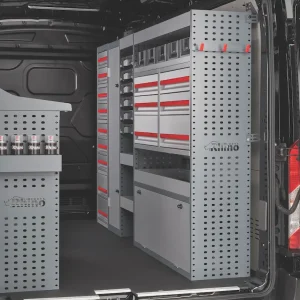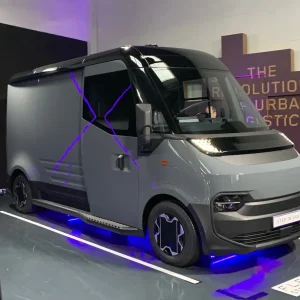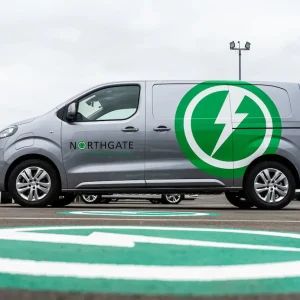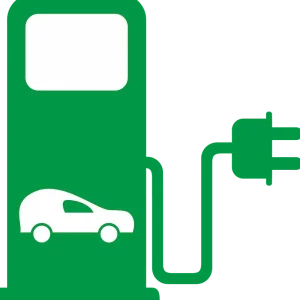Iveco has about a year’s head start to make its mark in the large electric van sector before its competitors beginning to come to market, according to product manager Martin Flach.
The manufacturer displayed an electric 3.5t Daily van at last year’s CV Show and it has been available in right-hand drive mode since October 2016.
So far Flach says the company has taken just one order, but he expects increasing interest going forward, particularly from urban-based dotcom delivery firms and local authorities as well as from businesses whose main concern is to establish an environmentally friendly reputation.
As ever, battery range, payload capacity and price remain the stumbling blocks for operators considering electric vans – particularly large ones.
The Daily is available with one to three batteries: £60,000 for a single-battery Daily, £80,000 for a two-battery Daily and £100,000 for a three-battery model. But, as Flach admits, “with three batteries you’ve lost the payload,” which is reduced to 800kg from about 1,100kg.
Under real driving conditions he says the battery ranges step up from 50 to 100 to 150 miles. To mitigate the prohibitive prices, the good news is that at 3.5 tonnes the Government’s ‘plugged-in’ van grant of up to 20% of the purchase price of the vehicle – up to £8,000 – still applies.
And above 3.5 tonnes, that extends to 20% of the purchase price up to £20,000 on the first 200 vehicles acquired. This, according to Flach, is when it starts to get interesting.
He has been heavily involved in lobbying the Government to extend the permitted weight limit for drivers holding regular licences from 3.5 to 4.25 tonnes when it comes to alternative-fuelled vehicles.
Similar laws already apply in France, Germany and Italy, and Flach is confident of a positive ruling on the issue by mid-2017. This would allow electric vans to carry an extra 350-400kg payload, thus overcoming the handicap at 3.5 tonnes.
Flach then does the sums to make the case for the financial viability of operating electric Dailys weighing 4.25 tonnes in central London with its congestion charge.
“Take a two-battery Daily at £80,000,” he says, “take 20% or £16,000 off as a plugged-in van grant – reducing it to £64,000. Take off the comparative price of a diesel vehicle, say £20,000, dropping it to £44,000. Off this, take the direct fuel advantages – a £5,000 saving per year on diesel but adding in £1,000 for the cost of electricity – so a £4,000 annual saving overall, and a £3,000 annual saving on the congestion charge. That’s a £7,000 saving in total every year over six years. Six times £7,000 equals £42,000 and all of a sudden you have a cost-neutral situation almost.”
Once the residual value, admittedly unknown as yet, of the vehicle is considered Flach claims an electric Daily would have a payback time of about six years for most operations.
“For some inner-city operations this is starting to make very practical sense,” he says, and claims Transport for London is increasingly keen to trial electric vans.
Flach says the batteries have a lifespan of seven years and are entirely recyclable upon disposal. Currently, a battery pack for the Daily could cost up to £20,000 to replace, but he claims this price will have dropped considerably within five years.
Flach admits electric vans do not suit all applications and says every dealership will include a member of staff who specialises in the technology and its limitations – such as how using the van’s electrical equipment – heater, lights, wipers –can eat into its range capacity.
“We quantify with the customer what they want to do,” Flach says.
But electricity is not the only alternative fuel Iveco offers with the Daily – it is also up for grabs as the Daily NP (natural power), in which guise it is fuelled by compressed natural gas (CNG) or compressed bio-methane (CBM).
On average, gas is 25% cheaper than diesel, says Flach, with 15% lower consumption.
Iveco adapted the Euro6 Daily NP from a diesel engine platform and claims it delivers similar performance to a diesel in terms of power, torque and response.
Iveco says the Daily NP emits 80% less carbon dioxide than diesel, cuts particulate matter emissions by 95%, and reduces nitrogen-oxide levels by 35%.
The brand also says the Daily NP is ideal for operators working in low-emission zones, and adds that because it is quieter than a diesel van it is also suitable for night-time deliveries.
The NP range includes single or twin rear-wheel models, with gross vehicle weights going from 3.5 to 7.2 tonnes. Multiple fuel tank layouts are offered, giving a range of between 155 and 280 miles between fill-ups.
The Daily NP can also be fitted with a small petrol tank reserve, allowing an additional range of up to 50 miles, in the event of running out of gas. All NP derivatives are powered by a 3.0-litre natural gas engine producing up to 136hp, with a maximum torque of 350Nm between 1,500-2,730rpm.
The drawback, as with plug-in vans, is on payload, which is 200kg less on the NP due to the steel fuel tank being heavier than the plastic tanks on diesel vans. The NP has a £4,000 price premium over equivalent diesels, but Flach claims that through saving about a third on fuel costs this can be recovered within three years.
Other disadvantages, however, are that gas-powered vans are not entitled to a Government grant, nor are they exempt from the London Congestion Charge. There are currently only 20 CNG filling stations in the UK, according to Flach, and operators must attain a fleet contract to use them.
He says Iveco will help source gas-fuelling stations for customers and adds that for orders of at least 15 NP vans a supplier would install a filling station.
“You can buy, lease or pay by the kilo for gas,” Flach says. He insists operators should select the most appropriate fuel for their usage and concludes: “The Government should be technology-neutral about alternative fuels.”
CV Show sidestep
Iveco has confirmed that it will not take a stand at April’s Commercial Vehicle Show at the NEC in Birmingham.
The brand, which has previously unveiled models such as its Daily Hi-matic and displayed futuristic concept vehicles like the ‘Vision’ van at the event, says it does not need to attend the exhibition every year and will instead target more localised trade shows.
Flach claims it costs “huge money” to exhibit at the show and adds that the return on this investment is impossible to determine.
He admits the event can be invaluable in making a brand statement, but says it is less useful when it comes to making deals with customers.
However, Iveco did confirm that one of its dealers, Guest Trucks, would appear at the NEC, with a Daily van included in its product display.





